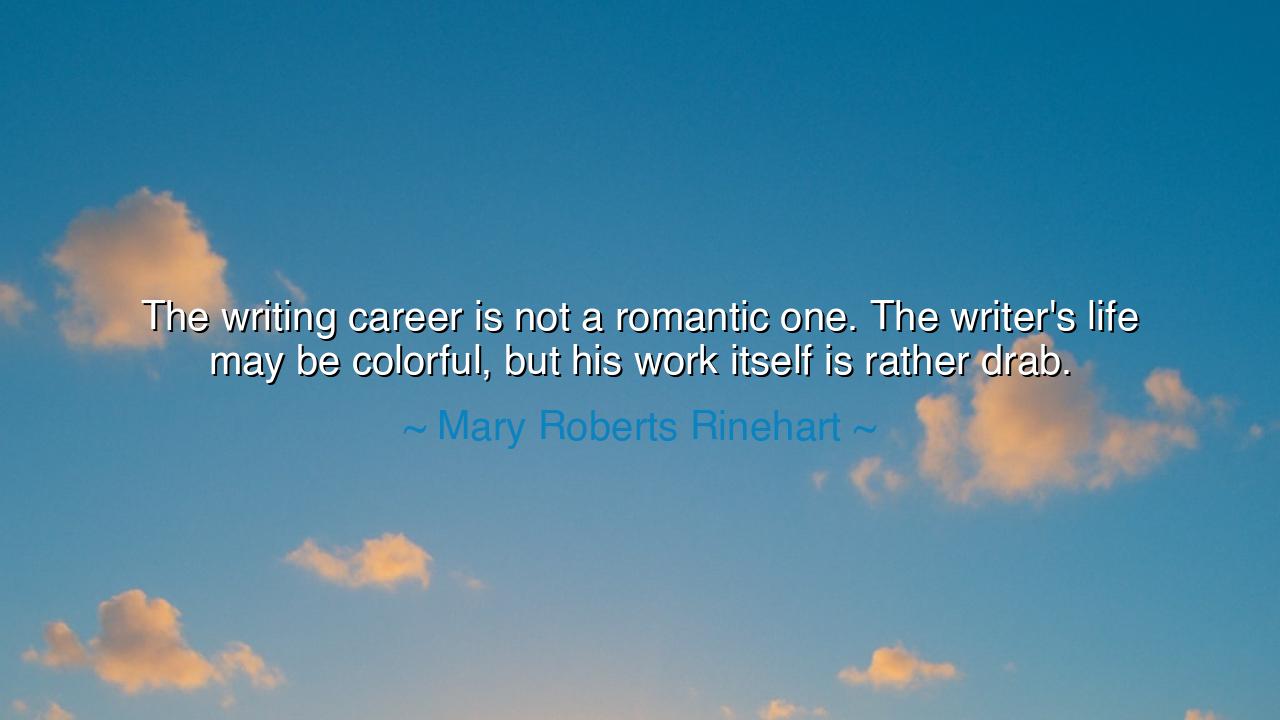
The writing career is not a romantic one. The writer's life may
The writing career is not a romantic one. The writer's life may be colorful, but his work itself is rather drab.






"The writing career is not a romantic one. The writer's life may be colorful, but his work itself is rather drab." These words from Mary Roberts Rinehart encapsulate a profound truth about the nature of writing and the creative life. While many imagine the life of a writer as one filled with romance, adventure, and glamour, Rinehart strips away these illusions to reveal the reality of the craft. Writing, she suggests, is not about the excitement of fame or the allure of artistry, but about the quiet, often unremarkable work of putting words on a page. It is a life that is more about discipline than inspiration, more about persistence than passion.
In the ancient world, the life of the scribe or philosopher was often seen through the lens of discipline and humility. Plato, for instance, wrote not for fame or glory, but to preserve the wisdom of his teachings and to engage the minds of others in the search for truth. His works were not written to win accolades but to provoke thought, to challenge assumptions, and to lay the foundation for future generations. Much like Rinehart’s view of writing, Plato’s life was not marked by the romanticism of fame, but by the solitude and labor required to bring ideas into the world through words. The true work of writing, then, is not in the external acclaim, but in the quiet effort to create something lasting.
Rinehart’s words also remind us that the writer’s life is often filled with invisible struggle and unseen sacrifice. Just as Homer, the ancient poet who gave us the Iliad and Odyssey, did not compose these monumental works in the lap of luxury, so too do modern writers toil in solitude, far from the glitz of public attention. The poet’s life, as Homer’s suggests, is filled with both joy and pain—moments of inspiration are rare, and much of the time is spent in the quiet struggle to find the right words, the right rhythm, and the right form. The creative life, in this sense, is both deeply fulfilling and profoundly demanding.
In a more modern sense, we can look to Ernest Hemingway, whose life, though filled with adventure and romanticized ideals of war, travel, and love, was grounded in the hardship of writing. Hemingway’s own struggle with writer’s block, the loneliness of his craft, and the effort required to compose works like The Old Man and the Sea reveal the very nature of Rinehart’s reflection. Despite the external romance of his life, Hemingway was deeply immersed in the mundane realities of his writing process. Writing was not a glamorous pursuit for him, but a relentless, almost mechanical act of putting one word after another.
Rinehart’s quote also serves as a reminder that the romanticized image of the artist’s life often obscures the grueling realities of the work itself. The idea that writers live lives of luxury or that their creativity flows effortlessly from them is a myth. In truth, much of writing involves sitting at a desk, facing the blank page, and wrestling with one’s thoughts. Virginia Woolf, though regarded as one of the greatest novelists of the 20th century, often wrote about the intense struggle to maintain focus and clarity in her work. Writing for Woolf, as for Rinehart, was not about romance or glamour but about sheer dedication to the craft. The work itself is not always thrilling, but it is the result of hard-won discipline.
The lesson of Rinehart’s words is one of realism. It calls us to understand that true artistry—whether in writing, painting, or any other craft—is not about the external trappings of success but about the quiet, relentless commitment to the work itself. The writer’s life may be filled with personal growth, discovery, and even adventure, but it is also marked by long hours of concentration, frustration, and failure. These moments of hardship are as much a part of the artistic journey as the moments of inspiration and triumph.
In our own lives, we must learn to embrace the effort required to achieve our goals, whether they involve creativity or any other pursuit. We should not be swayed by the illusions of effortless success or romanticized ideals, but instead, find strength in the daily grind. Just as Plato labored over his dialogues, just as Hemingway faced his own inner struggles, we too must remain dedicated to the task at hand, knowing that the true rewards of any craft lie not in the external accolades but in the internal growth and satisfaction of doing the work. In this way, we can approach our pursuits with the understanding that the work itself is where the deepest rewards lie.






AAdministratorAdministrator
Welcome, honored guests. Please leave a comment, we will respond soon